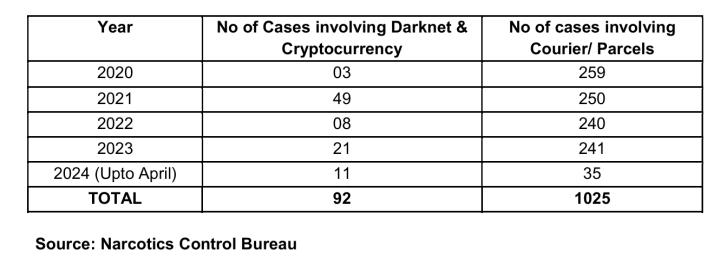- The Narcotics Control Bureau (NCB) of India is keeping a close eye on crypto transactions as part of its attempt to stop drug trafficking in the nation.
India has witnessed around 92 incidents between 2020 and April 2024 involving the dark net and crypto to purchase drugs.
The Narcotics Control Bureau (NCB) of India is keeping a close eye on crypto transactions made on the darknet.
This is part of its ongoing attempt to stop drug trafficking in the nation. Let’s discover more about this important news for crypto in India.
India’s Strategy to Combat Drug Trafficking and Crypto Use
The minister of state for home affairs, Nityanand Rai, recently shared India’s plan to reduce the movement of drugs within India as well as its importation.

Speaking to the parliament, Rai confirmed that India has witnessed around 92 incidents between 2020 and April 2024 involving the dark net and crypto to purchase drugs.
Rai detailed 13 action plans aimed at curbing growing cases of drug trafficking. Interestingly, two of these action plans seek to address the illegal use of cryptocurrencies.
He said, “A Special Task Force on Darknet and Crypto Currency has been constituted to monitor suspicious transactions related to drugs on Darknet.”
Furthermore, the NCB currently offers several training courses in cryptocurrencies, darknet, and digital forensics.
Crypto Tax Remains Unchanged in India
India is keeping its strict rules on cryptocurrency taxes. In the recent budget for the 2024-25 session, the Indian Finance Minister, Nirmala Sitharaman, didn’t mention any changes for cryptocurrencies.
This means that crypto investors in India still have to pay a 1% tax on every transaction they make. So, if they make any profits from trading or transferring cryptocurrencies, the government taxes those profits at a high rate of 30%.
Nirmala Sitharaman remains India’s Finance Minister.
This means 30% taxes on crypto and a 1% TDS are here to stay…
But brace yourself—some countries have 0% crypto tax.
Let me show you.
Pro tip to save Crypto Tax in India
at the end of thread
pic.twitter.com/MX4UPY3466
— Sumit Kapoor (@moneygurusumit) June 13, 2024
The rules are tough because they don’t allow people to balance their crypto losses with other types of income. This includes their salary or business income. Also, these losses can’t be carried forward to the next year.







